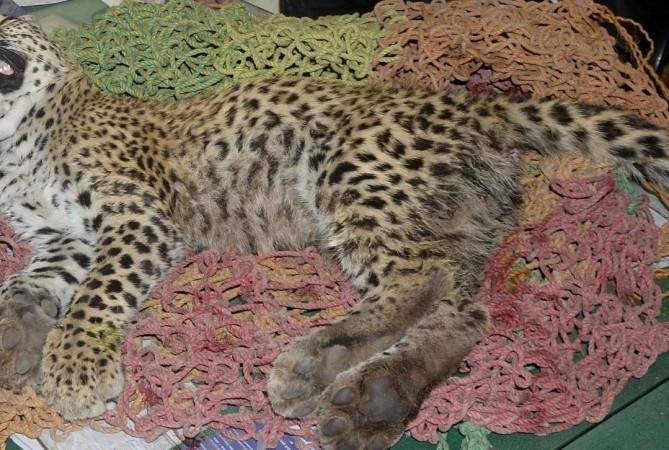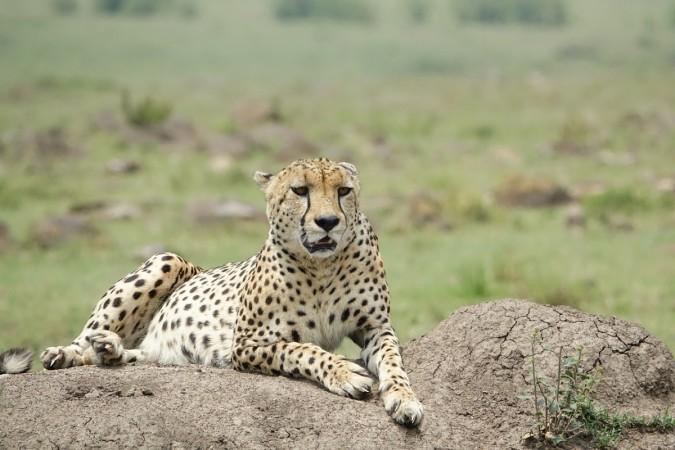In a significant development for 'project cheetah,' officials announced the successful capture of Nirva, a South African female cheetah that had been missing from the Kuno National Park (KNP) in Madhya Pradesh since July 21.
The cheetah was located on Sunday and underwent careful observation before being released back into the KNP. This news comes as a welcome relief to the team involved in 'project cheetah.' Two female cheetahs, Nirva and Dhatri, had vanished from the park's radar, with their radio collars ceasing to transmit signals. Tragically, Dhatri was discovered deceased on August 2.

Despite the setback, the KNP officials continued their tireless efforts to locate Nirva. Their persistent search finally paid off when Nirva was apprehended around 10 a.m. in the Dhoret range of the KNP, according to a press release by the Chief Wildlife Warden of the Madhya Pradesh Forest Department.
Following her capture, veterinary experts conducted a thorough health assessment, revealing Nirva to be in good condition. As a precautionary measure, she was temporarily housed within an enclosure known as a boma for further health evaluations.
The extensive search for Nirva involved a dedicated team of over 100 field personnel, including officers, veterinarians, and skilled cheetah trackers. Complementing their efforts were the deployment of two drones and a specialized dog squad, all engaged in a meticulous search operation spanning an area of 15-20 square kilometers.

Local villagers were also integral to the search efforts, as they were informed about Nirva and encouraged to share any pertinent information. Reports received from villagers were promptly investigated and verified by the authorities, underscoring the collaborative nature of the operation.
Project Cheetah
Inspired by the historical presence of cheetahs in India, "Project Cheetah" aims to reintroduce this magnificent big cat species, which once roamed the Indian landscape but became extinct in the 1950s due to various factors. The revival of the cheetah population holds immense ecological significance, as cheetahs play a crucial role in maintaining the health and vitality of ecosystems by regulating prey populations.
The project encompasses a multifaceted approach, including habitat restoration, scientific research, community engagement, and wildlife monitoring. Conservationists and experts are working diligently to identify suitable habitats where cheetahs can thrive, ensuring that the reintroduction process aligns with the well-being of both the cheetahs and the local communities.
Key components of "Project Cheetah"
- Habitat Assessment and Restoration: Thorough assessments are conducted to select appropriate habitats for cheetahs, focusing on areas with abundant prey and minimal human-wildlife conflict. Efforts are made to restore and enhance these habitats to create a conducive environment for cheetah survival.
- Translocation and Monitoring: Cheetahs from other regions with similar ecosystems are carefully selected for translocation to the designated areas. Stringent monitoring and tracking protocols are employed to ensure the cheetahs' adaptation, behavior, and overall health.
- Community Participation: Local communities are integral to the project's success. Collaborative efforts are undertaken to raise awareness, promote coexistence, and mitigate potential conflicts between cheetahs and humans.
- Research and Education: Scientific research is conducted to gain insights into cheetah behavior, genetics, and ecology. This knowledge contributes to informed decision-making and the development of effective conservation strategies.
- Global Conservation Impact: "Project Cheetah" resonates beyond India's borders, showcasing the country's dedication to global biodiversity conservation. It highlights the interconnectedness of ecosystems and the importance of safeguarding endangered species.
"Project Cheetah" symbolizes India's commitment to restore a species and contribute to the preservation of Earth's remarkable diversity.









